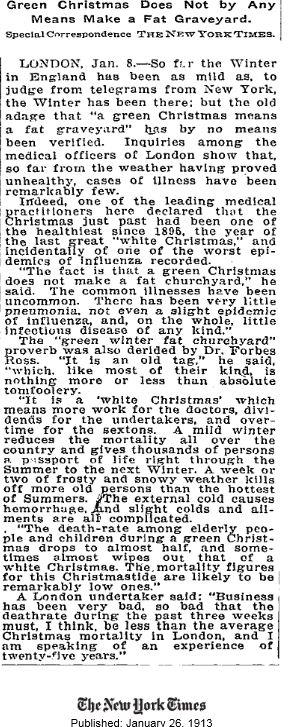Posted by Maeve on Tuesday, Jan 20, 2015
Are there truths behind the folklore, proverbs and phrases that many of us hear growing up? You know what I mean, like the woolly or fuzzy bear caterpillar, and if its black stripes predict it will be a colder winter than most. As for the woolly bear, it is not the best prognosticator of the severity of the winter. The woolly bear's coloring, at least according to a post on the National Weather Service Weather Forecast Office's website, depends upon a number of variables. "The woolly bear caterpillar's coloring is based on how long caterpillar has been feeding, its age, and species. The better the growing season is the bigger it will grow. This results in narrower red-orange bands in its middle. Thus, the width of the banding is an indicator of the current or past season's growth rather than an indicator of the severity of the upcoming winter. Also, the coloring indicates the age of the woolly bear caterpillar."
 Many of the adages have to do with predicting the weather or some type of weather-based observation. An expression I heard for the first time over the holidays was a green Christmas makes a fat churchyard. I poked around on the Internet to find out just what it meant and to see if I could trace it back in time. The most common reading of the phrase is that cold weather brings about fewer deaths. The reasoning behind this was that cold weather killed off the germs or stalled disease that was more rampant in warm weather. Or perhaps it was in warmer weather more folk circulated and came into contact with each other, thus spreading disease. Either way, the cold, they thought, kept germs at bay and people at home. Well, it turns out that cold weather or warm weather didn't really have that much to do with the death rate at the holidays. In fact as far back as 1913 The New York Times ran a piece disputing these nugget of weather lore based on a report from medical officers in London where a warm winter had not made for more deaths but fewer. The farthest back I could trace the adage was as an Irish seanfhocal, Nollag, ghlas, reilig mheith.
Many of the adages have to do with predicting the weather or some type of weather-based observation. An expression I heard for the first time over the holidays was a green Christmas makes a fat churchyard. I poked around on the Internet to find out just what it meant and to see if I could trace it back in time. The most common reading of the phrase is that cold weather brings about fewer deaths. The reasoning behind this was that cold weather killed off the germs or stalled disease that was more rampant in warm weather. Or perhaps it was in warmer weather more folk circulated and came into contact with each other, thus spreading disease. Either way, the cold, they thought, kept germs at bay and people at home. Well, it turns out that cold weather or warm weather didn't really have that much to do with the death rate at the holidays. In fact as far back as 1913 The New York Times ran a piece disputing these nugget of weather lore based on a report from medical officers in London where a warm winter had not made for more deaths but fewer. The farthest back I could trace the adage was as an Irish seanfhocal, Nollag, ghlas, reilig mheith.
The library has a number of books of phrases and sayings and even a title devoted just to weather folklore, Weather wisdom : being an illustrated practical volume wherein is contained unique compilation and analysis of the facts and folklore of natural weather prediction by Albert Lee. Are there old wives' tales or adages that you use, weather-based or not? And if there are, do any of them hold true? Please feel free to share them.


Add new comment